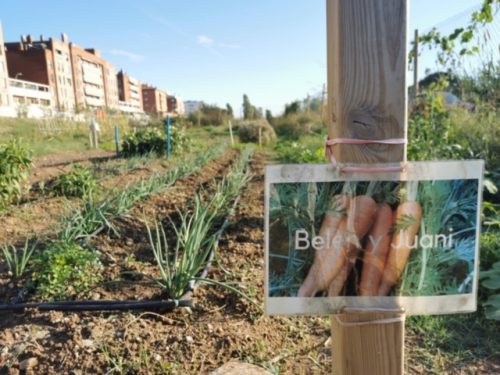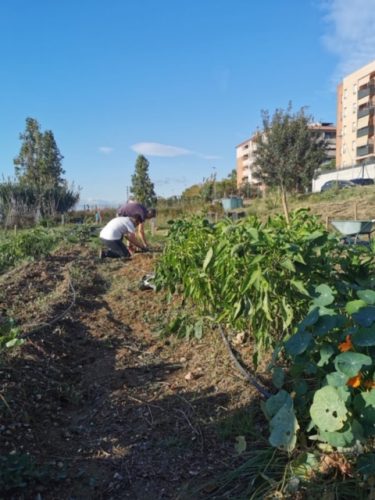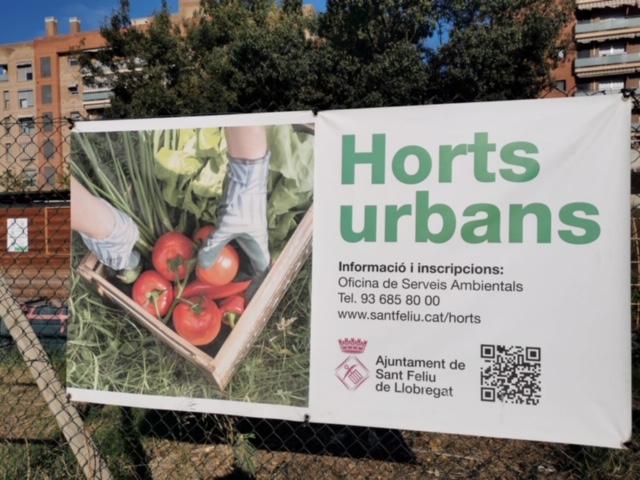On 24 October 2019, the annual meeting of EdiCitNet – Edible Cities Network (‘Edible Cities Network’) was held in Sant Feliu del Llobregat. The event brought together experts on NBS and representatives from different cities and universities from all over Europe.
 After the exchange of experiences, the members of the EdiCitNet consortium and the event attendes (representatives of the City Council and the city team) visited the referenced projects that integrate edible natural solutions in the municipality of Sant Feliu, the urban and peri-urban gardens of the Parc Agrari of Baix Llobregat and the social gardens nearby the Parc Agrari. This ECS combines the recovery of an urban space for agriculture and labor insertion. The visit was conducted by the director of the Solidarity Foundation of the University of Barcelona, a foundation that launched the social garden project, and a technician of the NGO Tarpuna (project manager).
After the exchange of experiences, the members of the EdiCitNet consortium and the event attendes (representatives of the City Council and the city team) visited the referenced projects that integrate edible natural solutions in the municipality of Sant Feliu, the urban and peri-urban gardens of the Parc Agrari of Baix Llobregat and the social gardens nearby the Parc Agrari. This ECS combines the recovery of an urban space for agriculture and labor insertion. The visit was conducted by the director of the Solidarity Foundation of the University of Barcelona, a foundation that launched the social garden project, and a technician of the NGO Tarpuna (project manager).
The Agricultural Park of Baix Llobregat (Parc Agrari) is located in the alluvial plains of the delta and lower valley of the Llobregat river in the metropolitan area of Barcelona. It occupies about 3,000 hectares of agricultural farms that belong to fourteen municipalities, including Sant Feliu de Llobregat. This urban agricultural area produces a great percentage of the fruits and vegetables that are sold in the Metropolitan Area of Barcelona markets. The farmers who work the land have acquired the know-how accumulated over the more than 200 years of horticultural tradition in the region.
The initiative of social gardens of Sant Feliu combines the recovery of a space for agriculture with the attention of people needs with difficulties in finding employment. At presen t, the beneficiaries of the project are long-term unemployment, as well as young people with difficulties in finding a job, who have accessed the project through the Municipal Social Services. These social gardens contribute to the well-being of people, both in the field of health and food, since the grown products are for personal consumption. The social garden project is an integrative solution for people at risk of social exclusion, as it improves the coexistence and social cohesion of the users, increase personal autonomy and self-esteem, help creating social networks, encouraging collective work, enhance local food and organic farming, as well as promoting healthy lifestyle habits.
t, the beneficiaries of the project are long-term unemployment, as well as young people with difficulties in finding a job, who have accessed the project through the Municipal Social Services. These social gardens contribute to the well-being of people, both in the field of health and food, since the grown products are for personal consumption. The social garden project is an integrative solution for people at risk of social exclusion, as it improves the coexistence and social cohesion of the users, increase personal autonomy and self-esteem, help creating social networks, encouraging collective work, enhance local food and organic farming, as well as promoting healthy lifestyle habits.
The City Council of Sant Feliu wants to take advantage of the momentum of the EdiCitNet project to promote social urban agriculture projects, the creation of more urban gardens areas with different groups in vulnerable situations and the improvement of the water irrigation management, including water reuse.
Article submitted by
Antonina Torrens
Fundació Solidaritat UB



